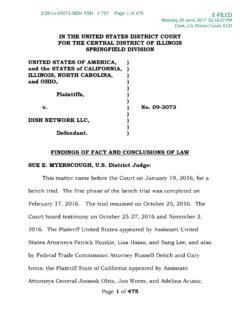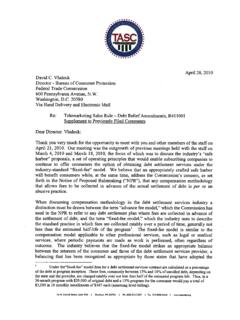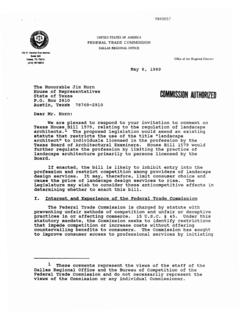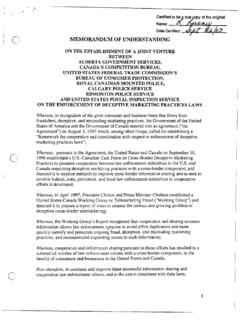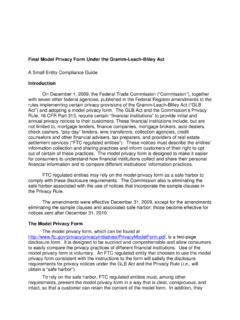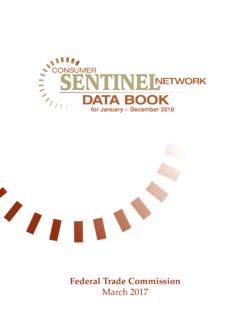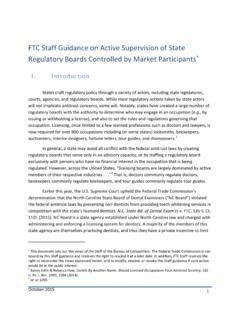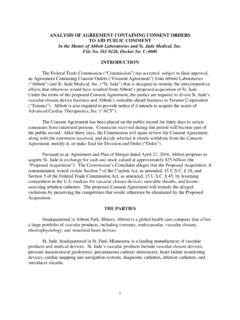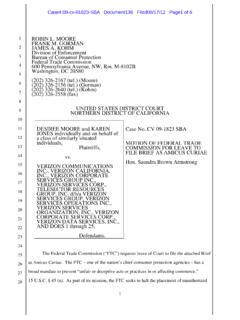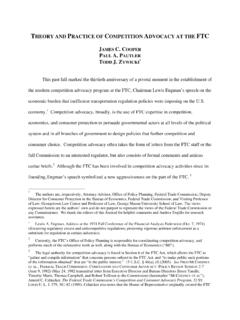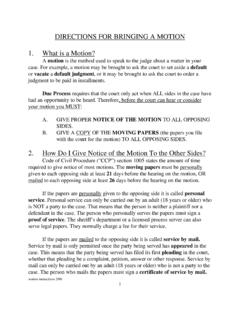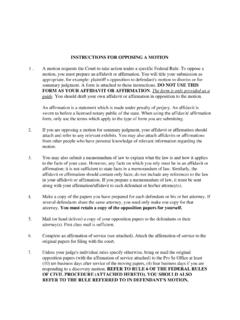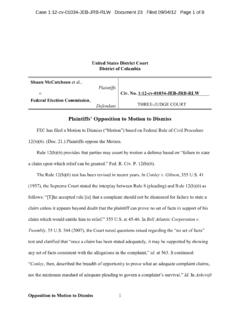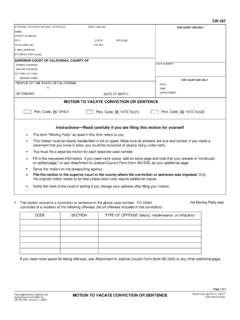Transcription of Plaintiff's Opposition to Defendant's Motion to Dismiss
1 1 UNITED STATES DISTRICT COURTSOUTHERN DISTRICT OF FLORIDAFEDERAL TRADE COMMISSION,Plaintiff, UNIVERSAL LENDING, LLC, a limitedliability company, SEAN ZAUSNER, individually and as owner,officer, or manager of First Universal Lending,LLC, DAVID ZAUSNER, individually and as owner,officer, or manager of First Universal Lending,LLC, and DAVID J. FEINGOLD, individually and asofficer or manager of First Universal Lending,LLC, No. 09-82322-CIV-ZLOCHPLAINTIFF S Opposition TO DEFENDANT S Motion TO DISMISSCase 9:09-cv-82322-WJZ Document 57 Entered on FLSD Docket 12/24/2009 Page 1 of 9 Defendants move to Dismiss the Complaint for failure to state a cause of action. Fed. P. 12(b)(6) provides that a party may assert a defense by Motion for failure to state a claimupon which relief can be granted.
2 Defendants mistakenly refer to Fed. R. Civ. P. 12(b)(5) - insufficient service of process,2but make no reference to any deficiency regarding service of process throughout their Motion . Defendants list of hodgepodge of ostensible grounds for dismissal on page 2 of their3 Motion , arguments to which are subsumed under the headings contained herein. It appears that Defendants Motion should correctly be titled a Motion for a More4 Definite Statement. 2 Plaintiff, the Federal Trade Commission ( FTC ), hereby submits its Opposition toDefendants Motion to Dismiss the Complaint with Prejudice. The FTC s Complaint not onlymeets but exceeds the standards governing the form of a complaint contemplated by FederalRule of Civil Procedure 8(a), this Court has subject matter jurisdiction in this matter, and theComplaint sufficiently alleges consumer harm and damage.
3 Accordingly, Defendants motionshould be FTC s claims are sufficiently move to Dismiss the FTC s Complaint for a) Failure to State a Cause ofAction and b) Lack of Subject Matter Jurisdiction. In support of their Motion , Defendants123argue that the Complaint lacks, inter alia, a definition of deception; lacks any example of injury;and lacks a factual basis. Defendants cite no valid authority to support the proposition that4these or any other supposedly missing ingredients are, in fact, required in the FTC s Complaint. Federal Rule of Civil Procedure 8(a) states that a complaint should contain a short and plainstatement of the claim showing that the pleader is entitled to relief, Fed. R.
4 Civ. P. 8(a)(2), andthat [e]ach allegation must be simple, concise, and direct. Fed. R. Civ. P. 8(d)(1). TheSupreme Court has explained that a complaint need only give the defendant fair notice of whatCase 9:09-cv-82322-WJZ Document 57 Entered on FLSD Docket 12/24/2009 Page 2 of 93the plaintiff s claim is and the grounds upon which it rests. Swierkiewicz v. Sorema , 506, 512 (2002); accord Atchison, Topeka & Santa Fe Ry. v. Buell, 480 557, 568 (1987) (under Federal Rule 8, claimant has no duty to set out all of the relevant facts in hiscomplaint ). Specific facts are not necessary in a Complaint; instead, the statement need only give the defendant fair notice of what the.
5 Claim is and the grounds upon which it rests. Epos Tech., 636 F. 57, 63 ( 2009) (quoting Bell Atlantic v. Twombly, 550 , 555 (2007)). Thus, the Federal Rules embody notice pleading and require only a concise statementof the claim, rather than evidentiary facts. Accordingly, Defendants Motion would beconsidered properly filed only where a Plaintiff's complaint is unintelligab[le] (sic), not wherea complaint suffers for lack of detail. Epos Tech., 636 F. Supp. 2d at 63 (citations omitted). The simplified notice pleading standard relies on liberal discovery rules and summary judgmentmotions to define disputed facts and to dispose of unmeritorious claims. See Swierkiewicz, at 512.
6 Indeed, courts have found that if the information sought by the Motion is obtainablethrough discovery, the Motion should be denied. See, , Towers Tenant Ass'n v. Towers 'ship, 563 F. Supp. 566, 569 ( 1983) (denying Motion for a more definite statementbecause details such as dates, times, names and places are the central object of discovery, andneed not be pleaded ).Here, the FTC s Complaint is not unintelligible or confusing and does not violate FederalRule of Civil Procedure 8(a) s requirement of a short and plain statement of the claim showingthat the pleader is entitled to relief. The Complaint clearly has a more than sufficient statementof the claim and more than meets the requirement that it be short and plain.
7 For example, the Complaint specifically identifies the actions of Defendants and how those actions are wrongful. Case 9:09-cv-82322-WJZ Document 57 Entered on FLSD Docket 12/24/2009 Page 3 of 94It describes in more than necessary detail the facts that the Defendants market, offer tosell, and sell to homeowners throughout the United States mortgage loan modification andforeclosure relief services. (Compl. 11); and market their services to homeowners who are infinancial distress, delinquent on their mortgage loans, or in danger of losing their homes toforeclosure. (Compl. 12). It describes how Defendants contact consumers (Compl. 13); Defendants representations to consumers (Compl.)
8 13, 14, 15, 16); Defendants website claims (Compl. 17); Defendants package of marketing materials sent to homeowners (Compl. 18,19); theamount of consumer injury and other activities that put consumers at further risk anddisadvantage. (Compl. 20 through 23, and 35). It also describes Defendants failure to keeptheir promises. (Compl. 23).Finally, the Complaint clearly puts Defendants on fair notice of the charges against them. Specifically, the Complaint charges that Defendants violated Section 5(a) of the FTC Act, 45(a) by misrepresenting, directly or indirectly, expressly or by implication, thatDefendants will obtain for consumers mortgage loan modifications, in all or virtually allinstances, that will make their mortgage payments substantially more Complaint also charges that Defendants violated Section (a)(2)(iii) of the TSR, (a)(2)(iii)
9 By misrepresenting, directly or indirectly, expressly or by implication,material aspects of the performance, efficacy, nature, or central characteristics of the loanmodification and foreclosure relief services they sell, including that Defendants will obtain forconsumers mortgage loan modifications, in all or virtually all instances, that will make theirmortgage payments substantially more 9:09-cv-82322-WJZ Document 57 Entered on FLSD Docket 12/24/2009 Page 4 of Court has subject matter Court has subject matter jurisdiction, despite Defendants claim to the contrary. InMorrison v. Amway Corp., 323 920, 925 (11 Cir. 2003), the Eleventh Circuit cautioned th that the district court should only rely on Rule 12(b)(1) [i]f thefacts necessary to sustain jurisdiction do not implicate the merits ofplaintiff's cause of action.
10 Garcia, 104 at 1261 (emphasisadded). If a jurisdictional challenge does implicate the merits ofthe underlying claim then: [T]he proper course of action for thedistrict court .. is to find that jurisdiction exists and deal with theobjection as a direct attack on the merits of the Plaintiff's economy is best promoted when the existence of a federalright is directly reached and, where no claim is found to exist, thecase is dismissed on the merits. This refusal to treat indirectattacks on the merits as Rule 12(b)(1) motions provides, moreover,a greater level of protection for the plaintiff who in truth is facing achallenge to the validity of his claim: the defendant is forced toproceed under Rule 12(b)(6).
